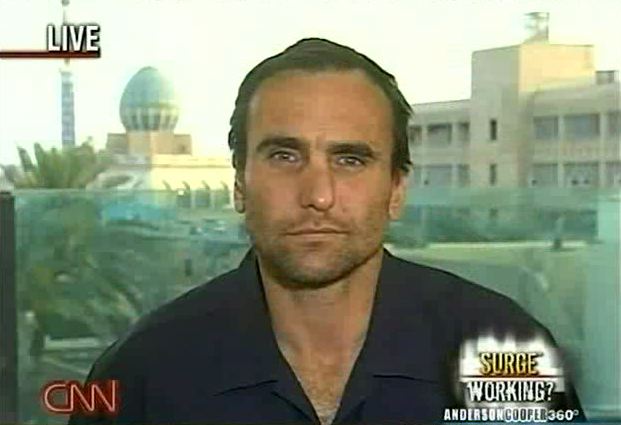AC: "...deaths are down because it's much harder to kill each other -- until the Americans withdraw and the real battle begins."

Click photo to play
Length: 4:45
ANDERSON COOPER: It has been nearly six months since the U.S. increased its troop levels in Iraq, and today U.S. military commanders said major attacks are declining. Officials said there were about half as many truck bombs and other large al Qaeda-style attacks in July as in March.
Of course, any reduction in the violence is great news, but the question is are major attacks declining as a direct result of the so-called troop surge? That's where things get more complicated.
Joining me now is CNN's Michael Ware.
Michael, the U.S. military commander in Iraq says that large-scale al Qaeda-style attacks have declined by almost 50 percent this year, down to 70 attacks a month from a high of 130. Is this because of more boots on the ground?
MICHAEL WARE, CNN CORRESPONDENT: Well, Anderson, the surge is a part of it. Militarily, the surge is designed to deny al Qaeda and the Shia death squads the freedom of movement they once had in Baghdad.
Are they doing that? Yeah, to some degree. The surge has shown some successes.
But the real success, Anderson, is coming from something totally different, and that is coming from America cutting deals with its former enemies, principally the Ba'athist insurgents, the Sunni insurgents.
It's by cutting a deal with the Ba'ath Party on the terms that the Ba'ath Party offered America four years ago -- and had to wait for America to be battered into submission to accept -- that the tide has turned against al Qaeda.
It's by unleashing the Ba'ath that the al Qaeda bombs are coming down, that the al Qaeda attacks are starting to slow down, not directly from the surge and not from the presence of U.S. troops.
What the U.S. troops are doing is giving a set of numbers, a series of data, a number of lowered attack figures that may give the military the political cover it needs in Washington. But at the end of the day, by cutting these deals the seeds are being sown for a much broader, more entrenched civil war that America will leave behind.
COOPER: Which is a long-term issue, not something which in the immediate, in the short term is, you know, is on the front burner.
WARE: Absolutely. I mean, right now the administration from President Bush on is pointing to an op-ed piece that appeared in "The New York Times" by two well-respected Brookings Institute figures, Michael O'Hanlon and Kenneth Pollack.
Now, they say that "yes, we were critics of the war, and we're seeing now positive signs." Yet even they said that what the surge is doing is not enough to produce victory, but it may produce a level of stability both we and the Iraqi people can live with.
Think about that. What we're saying is this isn't an American win. America is not on track to win this war. Even the president is not saying that. It just might be enough for America to get out of this war and not worry about the tens of thousands who will die at the hands of American-supported Sunni militias and Iranian-supported Shia militias.
Don't forget, by supporting the Sunnis in the way that they are, the American administration right now is picking sides in the civil war.
COOPER: In terms of talking about big al Qaeda-style attacks and this number reduction, in terms of the success story, what about sectarian violence? Has this escalation of troops had an impact on that?
WARE: No, not really. It's forced it to displace, it's forced it to morph and to adapt as we always expected it will.
Now the number of bodies -- tortured, mutilated, victims of sectarian death squads -- that are showing up on the streets of Baghdad continue to rise and fall. Right now, there's less than there used to be, but by less that's still 20 tortured people showing up every morning.
Now, the numbers are down for a number of reasons. One is two million people have fled the country. Another two million are displaced internally in refugee camps, so there's simply fewer targets. And of those who remain in the capital and in the villages surrounding, they now must live in segregated communities, heavily defended by their own militias, be they American-backed Sunni militias or Iranian-backed Shia militias. No one lives together anymore, very, very few people. This place has been ethnically cleansed and segregated.
So deaths are down because it's much harder to kill each other -- until the Americans withdraw and the real battle begins.
COOPER: Complicated picture. Michael Ware, we appreciate it. Thanks, Michael.
